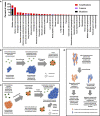FGFR3 Alterations in the Era of Immunotherapy for Urothelial Bladder Cancer
- PMID: 33224141
- PMCID: PMC7674585
- DOI: 10.3389/fimmu.2020.575258
FGFR3 Alterations in the Era of Immunotherapy for Urothelial Bladder Cancer
Abstract
FGFR3 is a prognostic and predictive marker and is a validated therapeutic target in urothelial bladder cancer. Its utility as a marker and target in the context of immunotherapy is incompletely understood. We review the role of FGFR3 in bladder cancer and discuss preclinical and clinical clues of its effectiveness as a patient selection factor and therapeutic target in the era of immunotherapy.
Keywords: bladder cancer; fibroblast growth factor receptor; immunotherapy; pharmacogenetics; targeted molecular therapy.
Copyright © 2020 Kacew and Sweis.
Figures

References
-
- Loehrer PJ, Einhorn LH, Elson PJ, Crawford ED, Kuebler P, Tannock I, et al. A randomized comparison of cisplatin alone or in combination with methotrexate, vinblastine, and doxorubicin in patients with metastatic urothelial carcinoma: a cooperative group study. J Clin Oncol (1992) 10(7):1066–73. 10.1200/JCO.1992.10.7.1066 - DOI - PubMed
-
- Powles T, Durán I, van der Heijden MS, Loriot Y, Vogelzang NJ, De Giorgi U, et al. Atezolizumab versus chemotherapy in patients with platinum-treated locally advanced or metastatic urothelial carcinoma (IMvigor211): a multicentre, open-label, phase 3 randomised controlled trial. Lancet (2018) 391(10122):748–57. 10.1016/S0140-6736(17)33297-X - DOI - PubMed
Publication types
MeSH terms
Substances
Grants and funding
LinkOut - more resources
Full Text Sources
Medical

